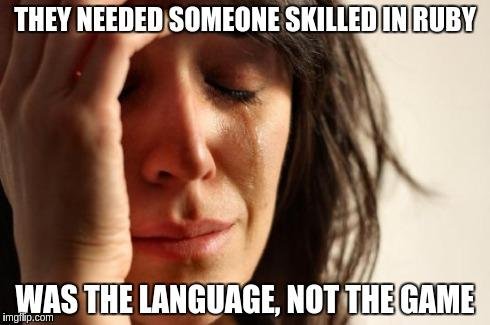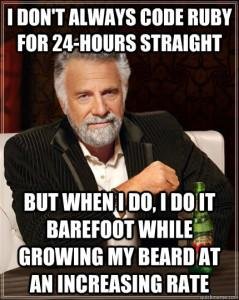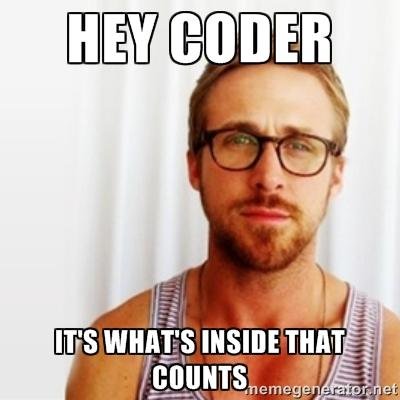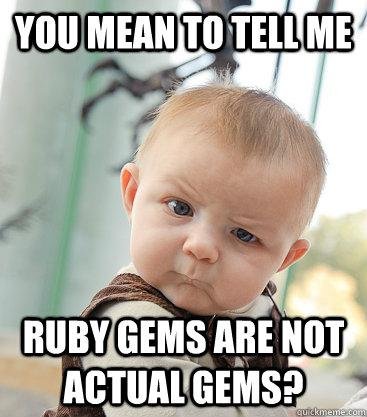
http://slides.com/kyrrehavikeriksen/cdu14-ruby/live
http://bit.ly/1zQNUh7
Ruby
Sinatra.rb
Haml



Agenda
- Om Ruby
- Sinatra.rb
- Haml

That's me...
Hva er ruby
Skapt av Yukihiro “Matz” Matsumoto i 1995.
Stable release 2.1.4 / October 27, 2014.
Hva bygger ruby på?
PERL
print "Hello World\n";SMALLTALK
Transcript show: 'Hello, world!'.EIFFEL
class
HELLO_WORLD
create
make
feature
make
do
print ("Hello, world!%N")
end
endADA
with Ada.Text_IO;
procedure Hello_World is
use Ada.Text_IO;
begin
Put_Line("Hello, world!");
end;LISP
(princ "Hello, world!")
Matz, speaking on the Ruby-Talk mailing list, May 12th, 2000.
Ruby is simple in appearance, but is very complex inside, just like our human body

5.times { print "We *love* Ruby -- it's outrageous!" }Alt er objekter
class Numeric
def plus(x)
self.+(x)
end
end
y = 5.plus 6
# y is now equal to 11Quirk #1
Seattle Style
puts array.delete hash.fetch :fooParenteser er valgfritt
class Ability
include CanCan::Ability
def initialize(user)
if user.admin?
can :manage, :all
else
can :read, :all
end
end
endclass Ability
include CanCan::Ability
def initialize(user)
if user.admin?()
can(:manage, :all)
else
can(:read, :all)
end
end
end var # could be a local variable.
@var # is an instance variable.
$var # is a global variable.
a = [1,2,3]
b = [1,2,3]
a == b # true
foo = Foo.new("hi")
bar = Foo.new("you!")
foo.equals? bar # false
x = "3"
y = x + "ho!" #result: "3ho!"
y = x + 3 #Wooo! Ruby won't like that
y = x + 3.to_s #Woho! result: "33"Dynamically & strongly typed
Quirk #2
c = class C
end
# c == nilAlt har retur verdi
x = 7
(1..3).each do |x|
p x
end
# => 3Frustrasjon #1
We got
closure
class SomeClass
def initialize(value1)
@value1 = value1
end
def value_printer(value2)
lambda {puts "Value1: #{@value1}, Value2: #{value2}"}
end
end
def caller(some_closure)
some_closure.call
end
some_class = SomeClass.new(5)
printer = some_class.value_printer("some value")
caller(printer)Quirk #3
Standardverdier som parameter
def sum(a = 1, b = 2, c = 3)
a + b + c
end
sum 3, 3
=> 9
sum
=> 6
def tables(t = {})
puts t
end
tables(absolute: true, round: true, precision: 2)
=> "{:absolute=>true, :round=>true, :precision=>2}"Single inheritance
class MyArray
include Enumerable
end
class Publication
attr_accessor :publisher
end
class Magazine < Publication
attr_accessor :editor
end
m = Magazine.new
m.publisher = "Time Inc."
m.is_a? Magazine #=> true
m.is_a? Publication #=> true
m.class == Publication #=> falseQuirk #4
x = true
y = x || 2
=> # y == 2
x = nil || y
=> # x == 2
# alt er som nevnt objekter
x = nil
def nil.quack
puts "quack quack"
end
x.quack
=> quack quackKun "false" og "nil" er false
When I see a bird that walks like a duck and swims like a duck and quacks like a duck, I call that bird a duck
# p036duck.rb
class Duck
def quack
'Quack!'
end
def swim
'Paddle paddle paddle...'
end
end
class Goose
def honk
'Honk!'
end
def swim
'Splash splash splash...'
end
end
class DuckRecording
def quack
play
end
def play
'Quack!'
end
end
def make_it_quack(duck)
duck.quack
end
puts make_it_quack(Duck.new)
puts make_it_quack(DuckRecording.new)
def make_it_swim(duck)
duck.swim
end
puts make_it_swim(Duck.new)
puts make_it_swim(Goose.new)Frustrasjon #2
expand = defined?( expand ) ? expand : true
if !defined?(expand) then; expand = true; end
expand = expand || true
expand ||= truedef foo(x)
return x, x+1
end
a, b = foo (10)
#=> [10, 11]Multippel returverdi

Put this in
your pipe
require 'sinatra'
get '/hi' do
"Hello World!"
end
and smoke it
$ gem install sinatra
$ ruby hi.rb
== Sinatra has taken the stage ...
>> Listening on 0.0.0.0:4567


Hva er Sinatra?
domene spesifikt språk for å effektivt lage nettapplikasjoner
get '/hello/:name' do
"Hello #{params[:name]}!"
end
get '/hello/:name' do |n|
"Hello #{n}!"
end
get '/posts' do
# matches "GET /posts?title=foo&author=bar"
title = params[:title]
author = params[:author]
endget '/' do
haml :index, :format => :html5
endeller
set :haml, :format => :html5
get '/' do
haml :index
endError-handling
not_found do
'This is nowhere to be found.'
end
error 403 do
'Access forbidden'
end
error MyCustomError do
'So what happened was...' + env['sinatra.error'].message
end
get '/' do
raise MyCustomError, 'something bad'
endSessions
enable :sessions
get '/' do
"value = " << session[:value].inspect
end
get '/:value' do
session[:value] = params[:value]
end
# litt mer avansert
use Rack::Session::Cookie, :key => 'rack.session',
:domain => 'foo.com',
:path => '/',
:expire_after => 2592000,
:secret => 'change_me',
:old_secret => 'also_change_me'
Haml is like a Zen garden and ERB is like crossing Broadway at rush hour in the rain
internett
Beautiful, DRY,
well-indented, clear markup:
templating haiku.
<section class=”container”>
<h1><%= post.title %></h1>
<h2><%= post.subtitle %></h2>
<div class=”content”>
<%= post.content %>
</div>
</section>%section.container
%h1= post.title
%h2= post.subtitle
.content
= post.contentERB
HAML
<strong class="code" id="message">Hello, World!</strong>%strong{:class => "code", :id => "message"} Hello, World!%strong.code#message Hello, World!<div class='content'>Hello, World!</div>.content Hello, World!!!!
%html
%head
%title Ciber Developer Update
= haml :"templates/header_imports"
%body
= haml :"templates/nav"
.container
%h3
Forslag til CDU 2014
.row
- get_suggestions.each do | key, suggestion |
- data = {
:key => key,
:value => suggestion,
:delete => false
}
=haml :"templates/suggestion", :locals => data%div.suggestion{:style => "background: #eee;"}
- if delete then
%a{:href => "/stats/suggestions/delete?id=#{key}",
:class => "pull-right"}
Slett
%strong
#{value["title"]}
%br
= value["description"].gsub(/\r\n/, "<br>")
%br
%br
%strong Format:
#{value["format"]}
%br
%strong Track:
#{value["track"]}
%br
%strong Ansvarlig:
#{value["responsible"]}
%br
.padding
Ruby foredrag
By Kyrre Havik
Ruby foredrag
- 322



